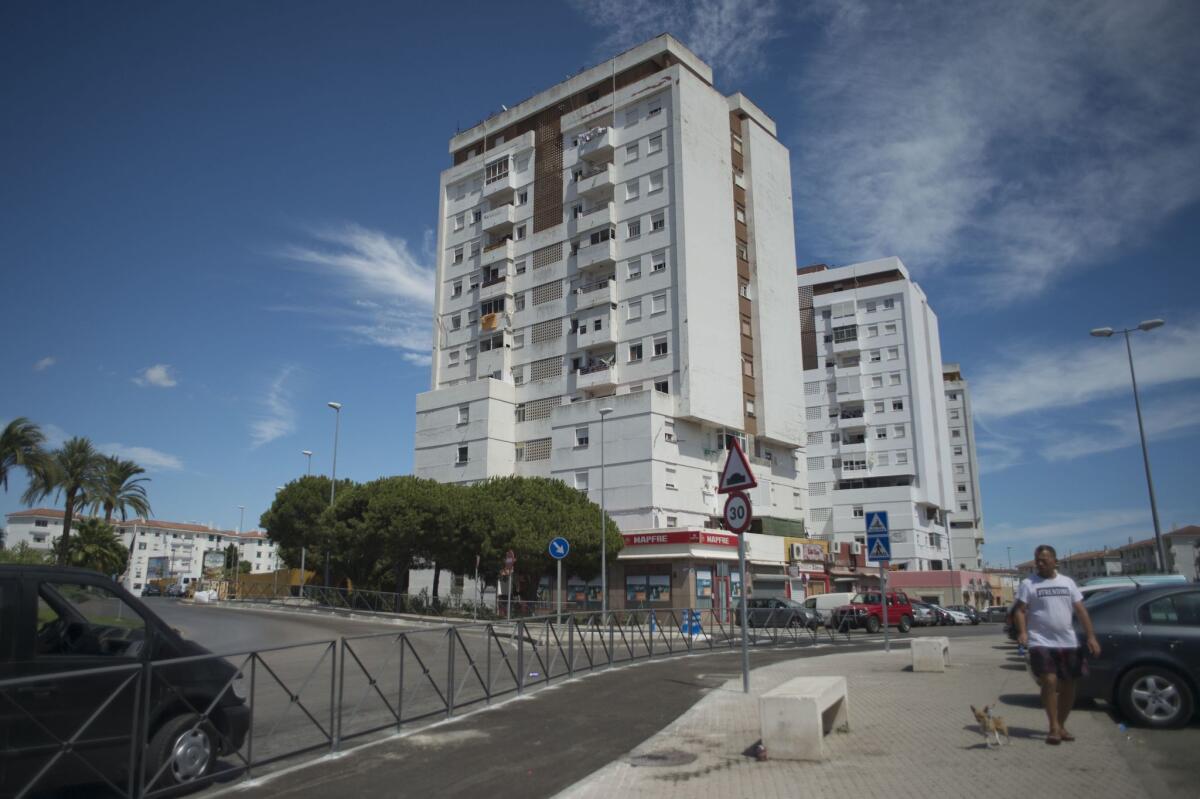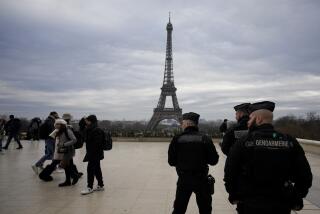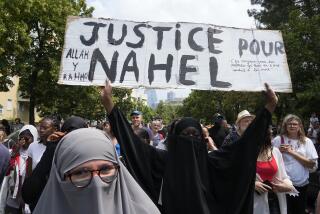In Spanish barrio, residents recall train attack suspect charged in France

The building in Algeciras, Spain, where train attack suspect Ayoub el Khazzani is believed to have lived in his youth.
Reporting from Algeciras, Spain — Flamenco guitars wail from open windows in this humid port city at Spain’s southern tip, where the local Spanish is accented with Arabic and the mountains of Morocco loom on the horizon, just across the Mediterranean Sea.
It’s here in the Algeciras working-class barrio of El Saladillo, in a stained stucco tenement strewn with laundry lines, that residents said Ayoub El Khazzani spent his formative years, embraced religion at a mosque under surveillance for extremism -- and first dabbled in crime.
Authorities in France have charged El Khazzani, 25, with attempted terrorism in an attack on a high-speed train traveling from Amsterdam to Paris on Aug. 21.
Armed with an assault rifle, a handgun and a box cutter, he fired shots and slashed at people before being tackled and subdued by passengers, including three young Americans vacationing in Europe. No one died. His lawyer said El Khazzani, a Moroccan national, had planned to rob people, not kill them.
The attack, along with the arrests this week of 14 people in Spain and Morocco on suspicion of planning other assaults, shook Spain’s Moroccan community, one of the country’s largest, oldest and best-integrated minority groups. Spain’s frontiers with Morocco, at two Spanish territories on the North African mainland, are believed to be a key entry point for militants traveling between the Arab world and Europe.
The attack also drew attention to the Schengen Agreement, under which residents of one European Union country can travel without a passport to most of the other 27 EU nations. With his Spanish residency, El Khazzani is believed to have traveled easily to France, Belgium, Austria and Germany, despite being on a security watch list in some of those countries for his suspected radical beliefs.
El Khazzani lived in Spain legally for seven years, after arriving from Morocco in 2007 with his parents and five siblings. Spanish authorities arrested and convicted him three times: twice in Madrid in 2009, for selling hashish on the street, and then again in 2012 for trafficking drugs across the border between Morocco and Ceuta, one of the Spanish territories in North Africa (along with Melilla).
In February 2014, El Khazzani told neighbors that he’d landed a job with a European low-cost cellphone company, Lycamobile, and left for France.
“He was a good kid. He used to like to play soccer, and go fishing -- normal stuff,” said Rachid Mohamed, who answered the door at the El Khazzani family’s fifth-floor apartment Wednesday.
He said El Khazzani’s father, Mohamed El Khazzani, a local scrap metal dealer, was so distraught over the allegations about his son, and the TV trucks parked outside his home, that he had gone into hiding.
Rachid Mohamed, who described himself as a close family friend, acknowledged Ayoub el Khazzani’s run-ins with the law but said religion had tamed him. Before he left for France, the young man had started to accompany his father and brother more frequently to the mosque, Mohamed said.
“Around two years ago he stopped going to discotheques and being such a hippie,” Mohamed said, referring to El Khazzani’s previous marijuana use. “He was getting his act together,” including a job painting houses.
By the time El Khazzani left Spain early last year, he was already on the country’s security watch list. An alert went out to other countries that he was involved in “radical Islam,” French and Spanish officials said. He is also believed to have traveled to Syria via Turkey.
Spanish officials would not specify why they put El Khazzani on the terrorism list. But it could have been because of where he prayed: The Taqwa mosque, considered the most extreme of Algeciras’ six mosques, has been under Spanish government surveillance for years, attendees said.
“I’m fine with it, because we have nothing to hide! We know we’re not radical. So let them come here, the plainclothes police, and listen to our sermons,” said Nordi Mohamed Ahmed, vice president of the neighborhood association that converted the mosque from an auto body shop several years ago.
El Khazzani’s father serves as the mosque’s caretaker, Mohamed Ahmed said, but he was missing Friday at what is normally the mosque’s biggest prayer gathering. Only a handful of faithful attended.
“Amid all the emotions they’re feeling, there’s a lot of shame,” said another worshipper, Mohamed Ali Mustafa Ammar, referring to the El Khazzani family.
Ayoub El Khazzani turned to religion after his closest companion, his brother Imran, also in his 20s, was deported to Morocco in 2013, acquaintances said.
Officially, the Spanish government expelled Imran El Khazzani because his residency permit had expired. But it may have also been because he had been preaching jihad at the Taqwa mosque, where he served as treasurer, the acquaintances said.
Spanish media have quoted unnamed intelligence officials as saying Imran El Khazzani’s role at the Taqwa mosque was part of the decision to deport him.
“Both brothers used to come into my shop, Imran and Ayoub, so I recognized him immediately when I saw his photo on TV,” said Juan Carlos Rodriguez, grinding keys at his hardware store behind the El Khazzanis’ home.
“I thought Imran was the more religious one, from the way they used to dress. Ayoub used to wear jeans. But after his brother was deported to Morocco, he started wearing a long white tunic and a white Islamic cap,” Rodriguez said.
By phone from Morocco, Imran El Khazzani told the French radio station RMC that Moroccan police had searched his home, confiscated his cellphone and detained him for several hours overnight Saturday, within hours of his brother’s arrest in France.
“I still do not believe it. His life was difficult, and he didn’t have much money,” the brother was quoted as saying. “I don’t know what he was doing.”
Belgian police also searched the Brussels home of a sister, Oumaima El Khazzani, whom Ayoub had recently visited.
Around the corner from the El Khazzani family home, a large red brick church sits across the street from the Omar mosque. Neighbors of both Spanish and Moroccan descent said they had never heard of any tension between the two faiths, nor violence, in the barrio.
The mayor of Algeciras, Jose Ignacio Landaluce, convened a town hall meeting Friday -- a rarity during summer vacation -- to introduce a motion calling for solidarity with the people of El Saladillo. It passed unanimously.
“Solidarity, hospitality, tolerance and diversity -- these are our riches,” Landaluce told the session.
After the town hall gathering, about 200 Algeciras residents gathered at the neighborhood’s main traffic circle, arm in arm, and vowed not to let the France attack divide them.
“We live here in peace and coexistence. We’ve never had a problem. This is a humble working neighborhood,” said Kamal Cheddad, president of the Muslim Community of Algeciras. “So it’s really a shame. I don’t know what he was thinking.”
Cheddad said he knew the El Khazzani family well, but that they didn’t attend the Omar mosque, closest to their home, where he leads prayers. Instead, they attended the Taqwa mosque, about 500 yards away, Cheddad said, shaking his head. He said it’s the only one of the municipality’s six mosques that he does not preside over.
“Now he’s lost his family, he’s lost his friends, he’s lost his future,” Cheddad said. “He’s lost everything.”
Frayer is a special correspondent.
More to Read
Sign up for Essential California
The most important California stories and recommendations in your inbox every morning.
You may occasionally receive promotional content from the Los Angeles Times.










